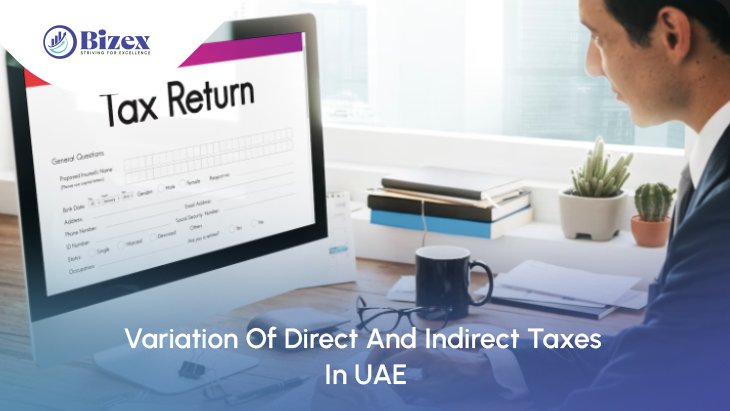Taxation is a critical aspect of any country's economic framework, and the United Arab Emirates (UAE) is no exception. While the UAE is renowned for its tax-friendly environment, understanding the differences between direct and indirect taxes is essential for residents, businesses, and investors alike. This blog post will delve into the nuances of direct and indirect taxes in the UAE, providing clear explanations and practical insights.
Understanding The Variation Between Direct and Indirect Taxes In The UAE
To Begin With Lets Have Look At Basic Definition Of Direct Taxes & Indirect Taxes
What Are Direct Taxes?
Direct taxes are levies imposed directly on individuals or entities. They are paid straight to the government by the taxpayer. In many countries, direct taxes include income tax, corporate tax, and property tax. These taxes are generally progressive, meaning that the tax rate increases as the taxable amount increases.
Corporate Tax In The UAE
The UAE does not impose federal income tax on individuals, making it a popular destination for expatriates. However, corporate tax is applicable to certain business sectors. Currently, corporate tax is primarily imposed on oil companies and foreign banks operating in the UAE.
1. Oil Companies: These entities are subject to tax rates that can reach up to 55%, depending on the emirate and the agreement between the company and the government.
2. Foreign Banks: Foreign banks are taxed at rates that can go up to 20%, varying slightly across different emirates.
The absence of income tax for individuals and the selective application of corporate tax in uae underscores commitment to maintaining a favorable tax environment for residents and businesses.
What Are Indirect Taxes?
Indirect taxes are levied on goods and services rather than directly on income or profits. These taxes are collected by an intermediary (such as a retailer) from the person who bears the ultimate economic burden of the tax (such as the consumer). Indirect taxes are regressive, meaning they take a larger percentage of income from low-income earners than from high-income earners.
Value Added Tax (VAT)
One of the most notable indirect taxes in the UAE is the Value Added Tax (VAT), introduced on January 1, 2018. The Average of TAX & VAT Services In Dubai Offers rate in the UAE is 5%, which is relatively low compared to global standards. VAT is applied to most goods and services, with some exceptions and exemptions to ensure that the tax burden is manageable for residents and businesses.
1. Standard-rated supplies: Most goods and services fall under this category and are subject to the 5% VAT.
2. Zero-rated supplies: These include exports of goods and services, international transportation, certain healthcare services, and educational services.
3. Exempt supplies: Financial services, residential properties, and bare land are examples of items exempt from VAT.
Excise Tax
The UAE also imposes an excise tax, introduced to reduce the consumption of harmful goods and to generate revenue for the government. Excise tax rates in the UAE are as follows:
1. Tobacco products: 100%
2. Energy drinks: 100%
3. Carbonated drinks: 50%
The excise tax is part of the UAE's broader strategy to promote healthier living and to diversify its revenue sources.
Key Differences Between Direct And Indirect Taxes In The UAE
Understanding the differences between direct and indirect taxes is crucial for effective financial planning and compliance in the UAE. Here are some key distinctions:
1. Nature Of The Tax
Direct Taxes: These are levied directly on the income or profits of individuals and businesses. In the UAE, direct taxes are limited and primarily target specific sectors such as oil companies and foreign banks.
Indirect Taxes: These are applied to the consumption of goods and services. The UAE's VAT and excise tax are prime examples, affecting a broad range of products and services.
2. Tax Burden
Direct Taxes: The burden of direct taxes falls on the taxpayer, who is responsible for filing and paying the tax. This includes companies in certain sectors that must adhere to corporate tax regulations.
Indirect Taxes: The burden is transferred to the end consumer. Businesses collect the tax on behalf of the government and remit it, making it less visible to the consumer compared to direct taxes.
3. Tax Rates and Application
Direct Taxes: In the UAE, corporate tax rates can be significant for affected sectors, such as the 55% tax rate for oil companies. However, these taxes are not widespread.
Indirect Taxes: VAT at 5% and excise taxes on specific products are more pervasive, impacting a larger portion of the economy and affecting everyday purchases.
4. Impact on Consumers and Businesses
Direct Taxes: These taxes can influence business decisions, especially in sectors subject to high tax rates. Companies might seek tax planning strategies to minimize their tax liabilities.
Indirect Taxes: These taxes affect consumer prices and purchasing behavior. For businesses, compliance with VAT and excise tax regulations requires diligent accounting and reporting.
Compliance And Administration
Compliance with tax regulations in the UAE is crucial for businesses to avoid penalties and ensure smooth operations. Both direct and indirect taxes have specific compliance requirements:
Direct Taxes
For sectors subject to corporate tax, businesses must maintain accurate records, file tax returns, and make timely payments. The Federal Tax Authority (FTA) oversees the administration of corporate tax, ensuring compliance and addressing any disputes or issues.
Indirect Taxes
Businesses subject to VAT and excise tax must register with the FTA, file regular returns, and maintain detailed records of their transactions. Compliance includes charging the correct tax rates, issuing valid tax invoices, and remitting the collected taxes to the government. The FTA provides guidance and support to help businesses navigate these requirements effectively.
The Future of Taxation In The UAE
The UAE's tax landscape is continually evolving to meet the needs of its growing economy and to align with international standards. As the country diversifies its revenue sources, further changes in tax policies and regulations can be expected. Staying informed about these developments is essential for residents, businesses, and investors.
Main Difference Between Direct & Indirect Taxes
Direct taxes are paid by taxpayers directly to the government, and the tax burden directly affects the taxpayer. The burden of indirect taxes is passed indirectly to consumers, as they end up paying the tax by increasing the price of goods and services.
Direct taxes reduce income and prevent savings. The tax evasion replaces the burden of a smaller part of the company. Indirect taxes reduce personal consumption and encourage savings. Consumers are cautious with heavily taxed products.
Direct taxes apply to moderate to high-income individuals and businesses. Indirect tax affects low -income people than those with low income.
Collecting direct tax is difficult if you are not deducted from the source, like the hired people. Tax evasion is a general business of business and imposes an ID card and a fine.Goods and Services Tax is unavoidable as it is included in the product price and is typically printed on the packaging of consumer products.
Examples include income tax, property tax, wealth tax, and corporate tax imposed on businesses.Examples include VAT, GST and central excise. VAT is levied on product prices and excise taxes are levied on production and retail trade.
Conclusion: Navigating The Tax Landscape In The UAE
Understanding the variation between direct and indirect taxes in the UAE is essential for effective financial management and compliance. While the UAE offers a favorable tax environment with no income tax for individuals, businesses in certain sectors must navigate corporate tax regulations. At the same time, indirect taxes like VAT and excise tax affect a wide range of goods and services, influencing consumer behavior and business operations.
By comprehending these differences and staying updated on tax policies, individuals and businesses can make informed decisions and optimize their financial strategies. The UAE's commitment to maintaining a competitive tax environment, while also ensuring sustainable revenue generation, makes it a unique and attractive destination for residents and investors alike.
In summary, whether you are a resident enjoying the tax-friendly policies or a business navigating the complexities of corporate and indirect taxes, understanding the nuances of the UAE's tax system is crucial. With careful planning and adherence to regulations, you can effectively manage your tax obligations and contribute to the country's dynamic and growing economy.










 1273
1273 


Leave a reply